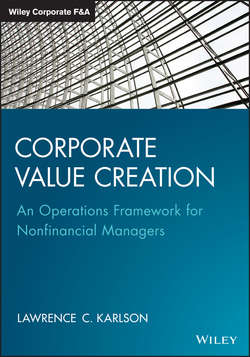Читать книгу Corporate Value Creation - Karlson Lawrence C. - Страница 16
На сайте Литреса книга снята с продажи.
CHAPTER TWO
The Envelope Equations 28
ОглавлениеCHAPTER 2 TAKEAWAYS
• In addition to new plant and equipment and software, companies routinely invest in quality control programs, productivity programs, research and development, marketing, sales, and administration. Companies also spend money on consultants, lawyers, accountants, investment bankers, and acquisitions. Expenditures of this type are also investments because the reason for such expenditures is to add or preserve value. If not, why would the company spend the money?
• One could argue that any expenditure that isn't an investment is a waste of money. “Operating Expenses” are really poorly named as such and perhaps “Operating Investments” would be more appropriate.
• Accounting for changes in Working Capital during the formulation stages of building a business plan is often not worth the effort. However, the importance of properly accounting for Working Capital requirements in the later versions of the business plan and managing Working Capital should not be minimized. There are many examples of companies that have gone out of business because they didn't manage their Working Capital (uncollectable receivables and poor inventory management) and ultimately ran out of cash.
• To a significant extent, this book is about Cash Flow since cash is the basic resource required by a business. In the long run, Net Income is the only source of cash and so its importance cannot be overemphasized.
• The amount of debt a company takes on is a function of its capital structure and this is ultimately decided by the owners of the business (shareholders) via the board of directors. In practice, however, the CEO and his management team are responsible for everything that happens in a business. Therefore, the management team can't get a free pass and hide behind the board of directors when it comes to capital structure. Stated simply, they have to deal with the hand that has been dealt and improve it over time.
• One could argue that management should not be primarily judged by how well they manage excess cash, nor should they be penalized for having to cope with excessive debt. A company takes on debt to leverage the return to equity holders and this debt has to be serviced. However, other than the case of a highly leveraged company created in a leveraged buyout29 or a string of poor management decisions, management are not hired to service debt per se. They are hired and should be incentivized to create value, not through financial engineering but through growth. As far as management is concerned, capital structure is only important periodically for such things as financing a major acquisition, and so on. In other words, it's extremely important for operating management, as the stewards of the shareholders' assets, to focus on value creation.
29
In a leveraged buyout environment, management should and will focus on debt reduction. However, everyone involved, management and shareholders alike, will be striving to minimize the period during which they manage for cash and get to a point where they can focus on creating value through growth.
